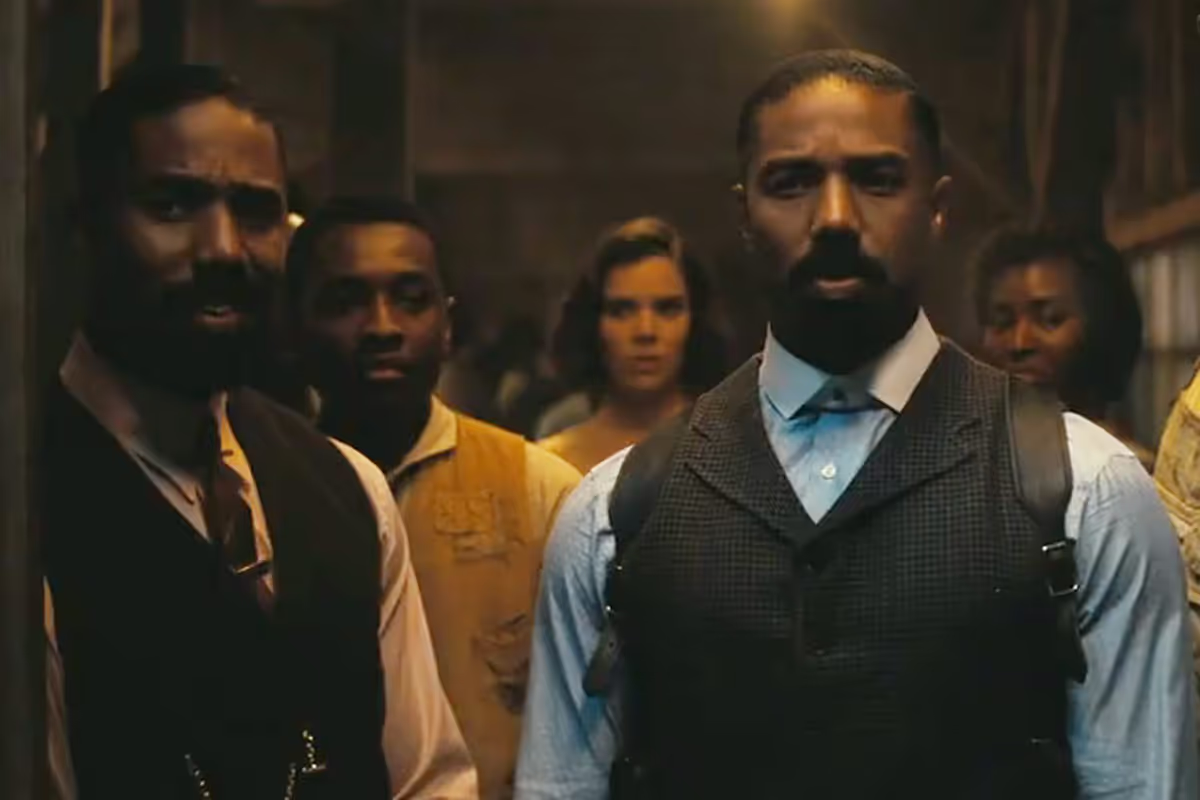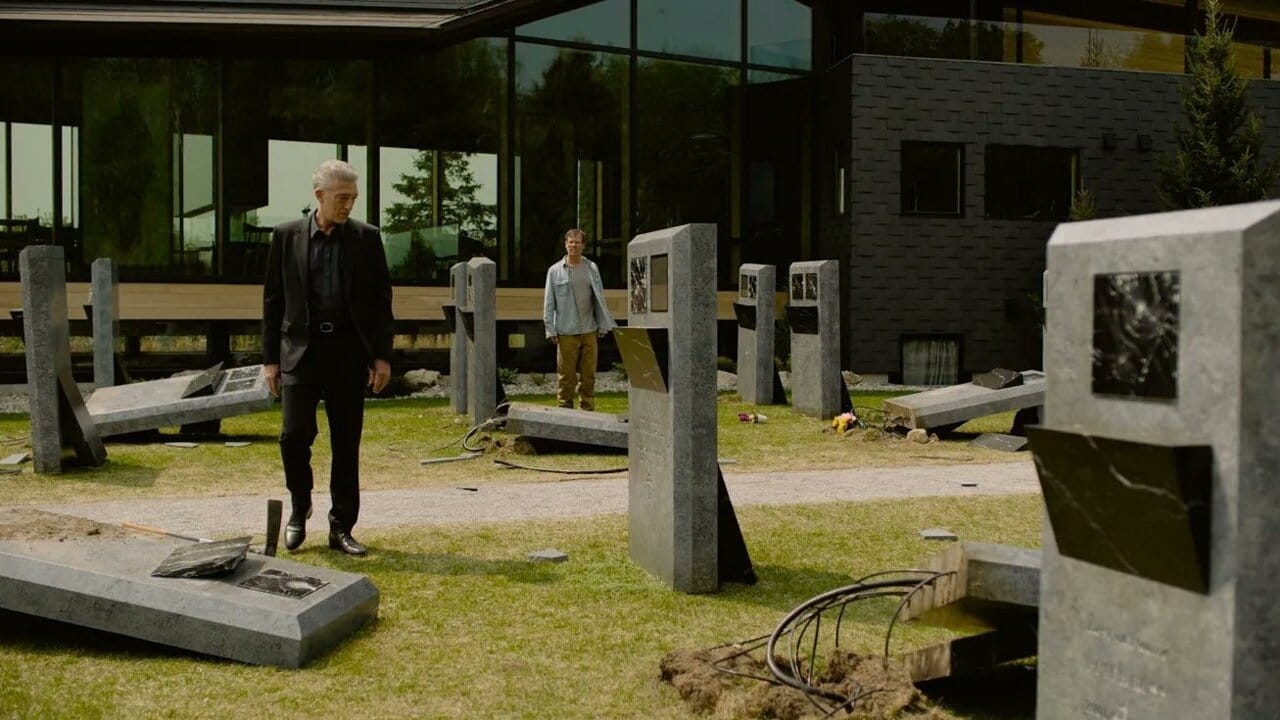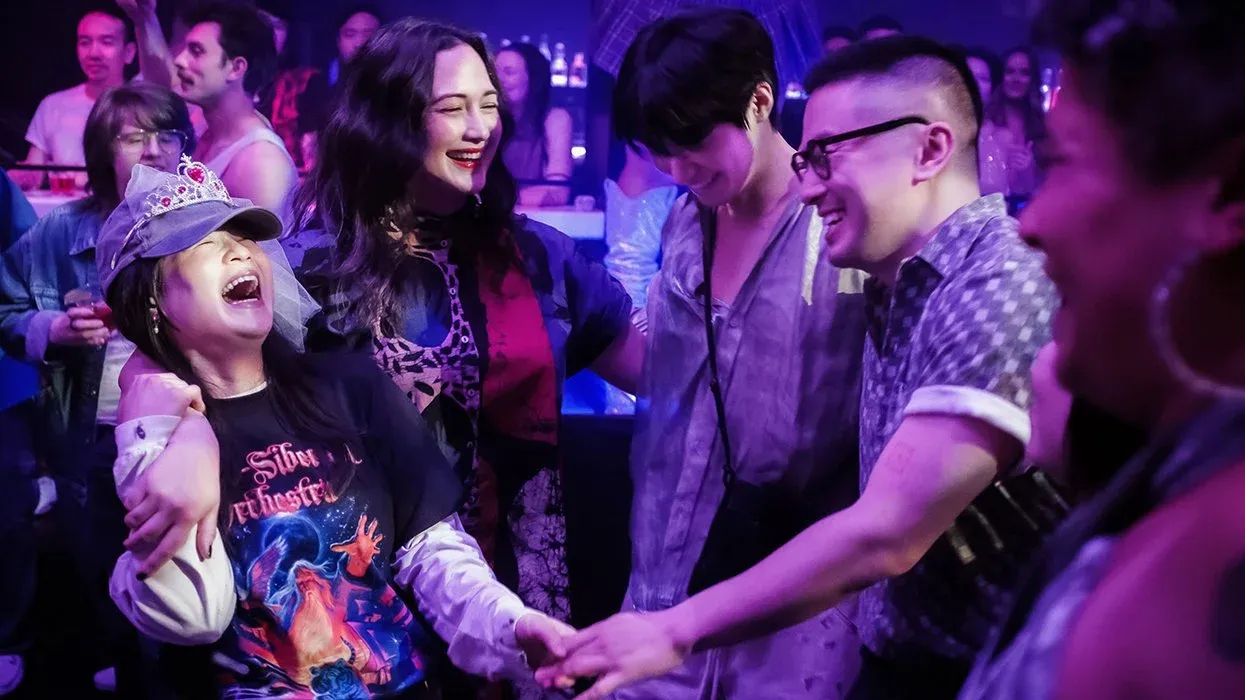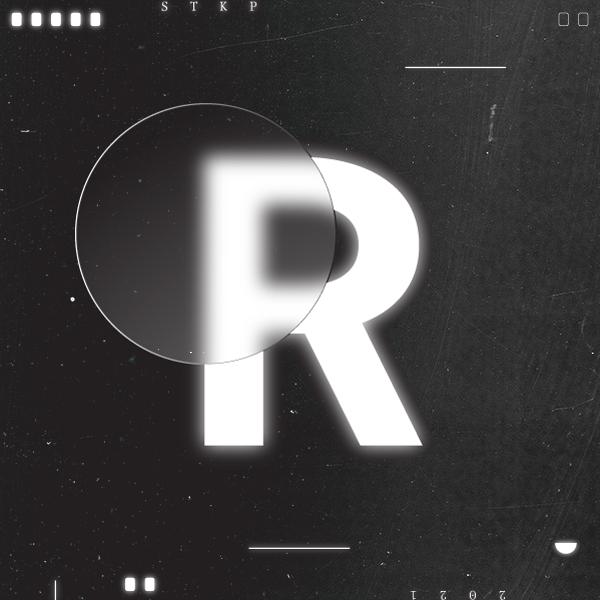In Review: 'Sinners,' 'The Shrouds,' 'The Wedding Banquet'
This week's new films include a Ryan Coogler thriller, a David Cronenberg chiller, and an update of a classic '90s comedy.

Sinners
Dir. Ryan Coogler
137 min.
The major challenge for young directors in a Hollywood system hopelessly addicted to IP is finding a way to be fully themselves, rather than wedging some fraction of themselves in material that forces them to compromise. After Fruitvale Station brought studio attention, director Ryan Coogler was able to bring significant juice to Creed and the two Black Panther movies, which managed to push strong ideas about Black identity and power through market-tested formulas. But with his exhilarating new horror movie Sinners, which he conceived and wrote from scratch, the filter is off and Coogler’s prodigious talent is completely unleashed, bringing a charge to an evocative vampire musical that doubles as a searing indictment of racism and cultural appropriation. It’s also a rollicking good time, which is to say that Coogler’s sensibility remains mainstream in a way that gives you hope for a better brand of modern blockbuster.
The Reveal is a reader-supported newsletter dedicated to bringing you great essays, reviews and conversation about movies. While both free and paid subscriptions are available, please consider a paid subscription to support our long-term sustainability.
Set in the picturesque environment of the Jim Crow South in the early 1930s, Sinners begins with twin brothers “Smoke” and “Stack,” both played by Michael B. Jordan, returning to their Mississippi hometown after accumulating some illicit wealth in Chicago. Unconvinced that the north is any more racially enlightened than this Klan-infested rural area, the siblings have decided to spend their money on a defiant bit of entrepreneurship. After purchasing an old sawmill to turn into a rollocking juke joint, they quickly work to assemble the locals to bring it to life, starting with Sammie (Miles Caton), a preacher’s son with deal-with-the-devil-level guitar talent, and Delta Slim (Delroy Lindo), an older musician who pours most of his meager earnings into corn liquor. The brothers also manage complicated relationships with former lovers, with Smoke returning to Annie (Wunmi Mosaku), a woman with whom he shares a tragic past, and Stack chased by Mary (Hailee Steinfeld), a siren of complicated identity.
But wait, there are vampires, too! The opening of a juke joint in Mississippi has a put-on-a-show pleasure all its own, but Coogler raises the stakes—and then lowers a few of them into wicked hearts—by introducing Jack O’Connell as Remmick, a seductive creature of the night who turns a couple of white supremacists to help ambush the party. There’s an obvious connection here to a film like From Dusk till Dawn, given that they’re both about club melees that have the sunrise as a natural ending point, but in terms of craft and thematic ambition, it’s like comparing “Chopsticks” to a symphony. Working on a large-format canvas—it’s worth seeing in IMAX to appreciate how much he toggles between different stocks and aspect ratios—Coogler bring a vibrant sheen to his period setting, but it’s the music that sets the film apart, engaging in the same audacious sort of hybridization that he brings to the story. A sequence in which the past and future of Black musical genres, fashions, and dance styles collide in a fevered montage is an obvious highlight, but that joyful spirit courses through the rest of the film, too, even as it inevitably darkens.
Coogler proves to be a vampire traditionalist—if the film has a flaw, it’s that the action sequences seem a little too familiar—but he finds a rich metaphor in the idea that vampires must be invited into a space in order to enter it. Remmick’s initial pitch to enter the juke joint as a banjo-picker is a silver-tongued con, friendly in its promises of peaceful collaboration but with a vampire’s hunger to drain it of life and take ownership of it. It’s less obviously rapacious than the hooded Klansman who also populate the area, but Coogler makes seem equally insidious and a more subtle, evolved form of racism. Sinners confirms that Coogler is most comfortable speaking through a Hollywood megaphone, but girded by the fine contributions of his cast—Lindo is a particular standout as a drunken wit—and the handsomeness of his production, he proves he can enlighten a large audience while lighting them up. Great times are rarely so vital. — Scott Tobias
Sinners opens in theaters everywhere tonight.


The Shrouds
Dir. David Cronenberg
119 min.
As The Shrouds begins, Karsh (Vincent Cassel) stares at the corpse of his wife Becca (Diane Kruger) with an expression of unrestrained pain and horror. This is quickly revealed as a dream or, if not a dream, some sort of vision experienced in the midst of a dental procedure. But it also feels like the truest moment we witness Karsh experiencing in the film (until, maybe, its final moments). Grief defines Karh’s existence. It’s even, his dentist tells him, starting to rot his teeth. But it’s an emotion Karsh cannot, or will not, confront directly. He spends his days finding ways to mitigate or distance himself from his feelings of loss and emptiness, recontextualizing Becca’s death as an element of a multinational conspiracy or marital infidelity or maybe both. A Toronto entrepreneur of seemingly limitless means, Karsh pours himself into the invention that gives the film its title, high-tech shrouds manufactured by the Karsh-owned company Gravetech that allow mourners to watch their loved ones’ bodies decay in real time. But there’s a difference between what Karsh can look at and what he’s willing to see.
That Graevetech’s product finds a viable niche in the funeral marketplace is the first sign that The Shrouds takes place in a David Cronenberg’s world, a place in which institutions like Consec, Spectacular Optical, and Cortical Systematics have thrived. But Karsh’s shrouds serve as the movie’s point of departure, not its destination. Whatever purpose Gravetech’s shrouds have served in Karsh’s own mourning, the company’s success has allowed him to dream up expansion plans in settings as far flung as Iceland and Budapest. That success has also seemingly created enemies who desecrate Gravetech’s Toronto location, leaving behind only mysterious runes. Could this have something to do with a group of Icelandic environmentalists? Could it have something to do with Soo-Min Szabo (Sandrine Holt), the blind wife of a dying Hungarian billionaire who’s newly entered Karsh’s life? Could Becca’s sister Terry (also played by Kruger), a dog groomer, offer any insights? Could Maury (Guy Pearce), a tightly wound IT expert and Terry’s ex-husband? What about Hunny (Kruger again), Karsh’s sultry and empathetic virtual assistant? Might engaging with some, maybe all, of these elements be attempts to avoid looking at the loss directly and screaming, as in his dreams?
The Shrouds is a dense and difficult film and likely to baffle anyone not already on Cronenberg’s wavelength. What’s going on becomes harder to explain as Karsh descends deeper and deeper into seemingly incompatible explanations of who’s behind the desecration and what, if anything, it has to do with Becca’s fatal illness. But where the blurry realities experienced by protagonists of Cronenberg films like Videodrome, eXistenZ, and Naked Lunch could be attributed to outside factors like drugs and virtual reality, The Shrouds rips away any framework that might allow viewers to stand outside the narrative and attempt to explain what’s going on. It’s Cronenberg’s Finnegans Wake. He’s speaking his own cinematic language now.
But The Shrouds is also both as darkly funny and personal as any film in Cronenberg’s filmography. Cassel being styled to resemble the director would be a tell even if Cronenberg hadn’t been so frank about discussing the film in terms of the death of his wife in 2017. Early in the film, Karsh discusses Becca’s unwillingness to be cremated in terms of the Jewish belief of the soul clinging to the body as it decays. Cronenberg’s interest in the relationship between soul and body and how changes in one affect the other (often with technology playing a role in the process) has been evident in his work from the start. With The Shrouds, he considers that relationship in its final stages. In some of the most affecting scenes, Karsh recalls intimate moments with Becca in dreams that project them through the lens of her disintegration and a body that grew fragile and fell apart even as the connection between husband and wife remained strong. The scenes are both thought-provoking and disturbing on an almost biological level. (The word for that is “Cronenbergian.”) But they’re also remarkably moving and help make The Shrouds the sort of requiem that only Cronenberg could create. Faced with death, he didn’t look away. This is what he saw. —Keith Phipps
The Shrouds opens in limited release tonight before expanding.


The Wedding Banquet
Dir. Andrew Ahn
103 min.
Andrew Ahn’s The Wedding Banquet is more a remix of Ang Lee’s 1993 breakthrough of the same name than a remake. Co-written by Lee, Schamus, and Neil Peng, the original took place in a world without legalized gay marriage, a pre-Ellen era when a Vanity Fair cover with k.d. Lang, Cindy Crawford, and a barber’s chair could become something of a national scandal. A 2025 film about a sham marriage between a man and a woman used to cover up a relationship between two gay men and secure a green card risks being out of touch with the times. (And hopefully will be in the years to come.) Ahn’s version, which he co-wrote with Schamus, sticks to the broad outline of the original while updating all the elements within that outline. Its four central characters—three of them millennials on the far end of their thirties, with one exception—have grown up in a world in which such charades aren’t just unnecessary but insultingly retrograde. And yet they still find themselves in a situation where engaging in one comes to make a certain amount of practical sense.
Angela (Kelly Marie Tran) is a biologist in the midst of a second round of IVF treatment with her activist partner Lee (Lily Gladstone). Angela’s mother May (Joan Chen), after initially distancing herself from daughter after she came out, is now almost embarrassingly supportive. They live in a Seattle house with a garage / guest house shared by Chris (Bowen Yang), Angela’s best friend since college, and Chris’s boyfriend Min (Han Gi-chan), a younger artist who’s heir to a wealthy Korean family. Min’s green card is set to expire, but he wants to marry Chris anyway. The problem: Chris isn’t ready to be married. A possible solution: Min can marry Angela, secure a green card, and use his family money to pay for IVF. Everyone wins, right?
The complications that follow prove predictable, but only up to a point. Min’s homophobic grandfather is too sick to travel to the United States, but his grandmother Ja-Young (Minari’s Youn Yuh-jung) can make it, and proves to be both savvier and more sympathetic than expected. (The foursome’s attempts to present themselves as two heterosexual couples barely lasts a single scene.) That takes the film in some unexpected directions, and though Ahn’s The Wedding Banquet never achieves the comic momentum or emotional depth of Lee’s original, it’s an unfailingly pleasant film filled with endearing characters trying to figure out what they really want from the rest of their lives and what compromises they’re willing to make for those they love. Culture can shift a lot in 32 years, but the human heart remains much the same. —Keith Phipps
The Wedding Banquet opens in select theaters tonight.





Discussion